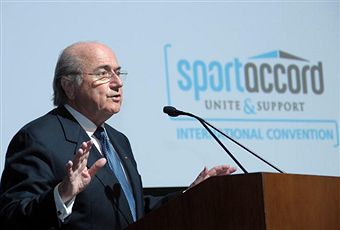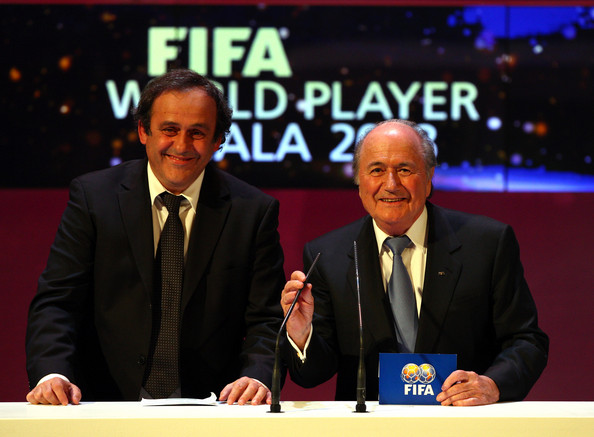Sepp Blatter has always been insistent that football should control itself and not be run by politicians.
Yet the great irony is that he is the ultimate football politician, the man who could teach many a professional politician a trick or two.
Back in 2001 when Jacques Rogge took over from Juan Antonio Samaranch as President of International Olympic Committee, he said he had learnt his politics from the wily Spaniard. But even more than Samaranch, and long before any other sports administrator realised this, Blatter had worked out what a wonderful opportunity being head of the world game provides.
His use of the Goal Project is perhaps the best illustration of this. This is football’s version of what American politicians call pork barrel politics, politicians making sure their constituents get benefits for voting for them.
All this was again well emphasised when I caught up with Blatter last week at the SportAccord Summit which was held in the Middle East for the first time.
Blatter at these events is not quite the kingly figure he is at his own FIFA occasions where sometimes he is so regal that he can even alter the way a FIFA Congress traditionally operates.
The best example of this came at Buenos Aires in 2001. Then he was in the middle of his fight with UEFA over the governance of FIFA. The Europeans had come to the Congress prepared to raise very serious issues about FIFA’s finances following the collapse of ISL, the management company. They were convinced their questions went to the very heart of how Blatter was managing or, as some in UEFA alleged, mismanaging FIFA.
But Blatter outfoxed the Europeans. The convention is that the President says a few words then hands over to the secretary who takes the roll call and calls the Congress to order. It is only then the formal proceeding of the Congress starts. But Blatter, aware that his then general secretary Michel Zen-Ruffinen was hostile to him and working with the Europeans, used his opening remarks to launch a defence of his regime.
He not only began making a speech even before the Congress had formally opened, but he then called for a vote. When Zen-Ruffinen said that a ballot could not be held as the roll call had not been taken, Blatter brushed this aside as a mere technicality. He took a show of hands and demonstrated his hold over the delegates. UEFA was holed even before its ship had managed to leave the port.
 Here in Dubai he seemed just one of the many delegates, accompanied by the ever faithful Walter Gagg who has the title Technical Adviser, Executive Office of the President: two very respectful looking gentlemen helping themselves to early morning coffee from a machine. But when I began to ask him about FIFA politics, there was Blatter the football politician at work.
Here in Dubai he seemed just one of the many delegates, accompanied by the ever faithful Walter Gagg who has the title Technical Adviser, Executive Office of the President: two very respectful looking gentlemen helping themselves to early morning coffee from a machine. But when I began to ask him about FIFA politics, there was Blatter the football politician at work.
Just before we arrived in Dubai there had been a news story that Jack Warner was taking time off from FIFA.
So did this mean Warner was perhaps thinking of finally leaving FIFA, an organisation that has brought him such benefits?
Blatter smiled, “Jack Warner is in politics again.” Then with a laugh he said, “He will never retire from FIFA.”
A few years ago there was talk of a rift between Warner and Blatter but it was clear from Blatter’s response that whatever differences there where, they have long been buried.
I am not sure that the same is the case with Blatter and Mohammed Bin Hammam.
Blatter had come to Dubai after a brief stop in Qatar. Bin Hammam had said he would not stand for the FIFA Presidency, for which the elections will take place next year. Blatter had made encouraging noises about Qatar which is bidding for the 2022 World Cup. His statement that the Middle East should host the World Cup was interpreted as support for Qatar and a deal done with Hammam.
Talking to Blatter it was clear that it was not as simple as that.
Nothing in recent FIFA politics has been more fascinating than the fluctuating relationship between Blatter and the head of the Asian Football Confederation (AFC). A few years ago Bin Hammam was so close to Blatter that when Blatter was trying to fend off UEFA and prevent Issa Hayatou taking over as President, the Qatari left the bedside of a very sick child of his to campaign for Blatter. When that story went round international football circles, there were shock waves that any man could feel so passionate about another.
But as we all know in the last year relations got so rocky that there were those close to Bin Hammam who felt Blatter did not want his former friend re-elected as AFC President. About this time last year, when I was interviewing Blatter, one of Bin Hammam’s confidants asked me to ask Blatter where he stood in relation to the AFC elections, a sign of the nervousness in the Hammam camp
In Dubai, when I asked Blatter about Bin Hammam his comments were very interesting. He said: “Relations with Bin Hamman were based on a big misunderstanding or bad information. I met him the other day in Qatar but only for five minutes. He will come to Zurich and we will then speak about this situation.”
According to Blatter, Bin Hammam agreed that there had not been “the right contact” between the two men, “I said to him, for me I always believe in giving respect to all the members of the executive committee especially to the Presidents of the Confederations.”
This prompted me to ask: ”Are you friends again?”
At this point Blatter laughed which suggested that the old relationship had not been restored. He then went on to tell me the story of how he made sure that Bin Hammam got re-elected as President of the AFC last year.
“If I had not been present in Kuala Lumpur he would not have been elected. It was the last minute presence of the FIFA President at his side in Kuala Lumpur on 8 May last year, my presence got him elected.”
The way he told the story it is clear he feels Bin Hammam owes him something. Of course this does not rule out a challenge. “I know in Asia they have said they will have a candidate. But which candidate I don’t know.” This is clearly a reference to what his old enemy Dr Chung may be up to.
Contrast his remarks about Bin Hammam with another President of a confederation, Michel Platini of UEFA. Like Hammam, Platini was once very close to Blatter.

But now Blatter has no hesitation in defining very clear blue water between him and his one-time protégé. About Platini he told me: ”We have not the same view about football when it comes to the world stage. He is in Europe and as President of Europe he has to defend European interests. When he is in FIFA, as vice-president he must also defend the global game.”
The differences centre on Blatter’s pet project: six plus five which Platini does not support because it is contrary to EU rules. In Blatter’s eyes, Platini is too close to the EU, a body Blatter feels interferes too much in sport.
But one reason Blatter spells out the differences between the two men is that he sees no threat from Platini as far as his control of FIFA is concerned. Platini, who has his hands full with UEFA, will stand for re-election in UEFA and, unlike Hammam, cannot mount a challenge backed by Asian money.
Of course it must be said that, when it comes to the FIFA Presidency, Blatter exudes confidence. He has no doubts about the support he has from his “FIFA family”.
“I am not worried about the elections. I don’t need to campaign. That is not presumptuous. I am 35 years in FIFA, they know me. Either they want me or they don’t want me.”
And who can doubt that, given the control he has exercised over the “family”, he will remain the one man who does not have worry about being re-elected.
Mihir Bose is one of the world’s most astute observers on politics in sport and, particularly, football. He formerly wrote for The Sunday Times and The Daily Telegraph and until recently was the BBC’s head sports editor.

.jpg)